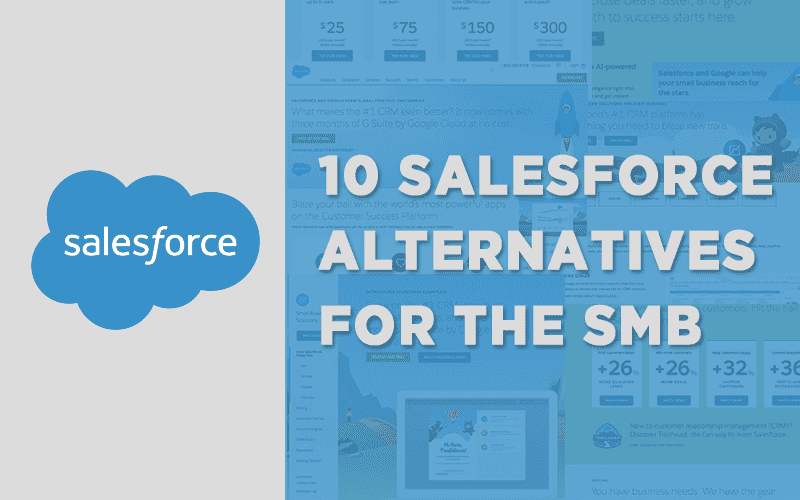Any kind of change is a little nerve wracking for most people. It’s not easy to come to the conclusion that change is necessary, and less so when you need to convince others that you’re right. Make it a technological, change and you’re looking at a very steep hill to climb.
However, when the change you wish to make is for the best, people will jump on board. But you have to sell them the idea. And selling something to a salesperson who knows the tricks of the trade will probably have you wondering why you’re even bothering.
So You Want to Make the Switch to CRM Software...
CRM software is one of those things that tend to intimidate late-to-the-game businesses and sales teams who look at the long lists of features that solutions provide their users and think There’s no way I’ll ever learn to use that, especially if they’ve worked for your business for years and are used to the old way of doing things.Firing everyone and starting fresh is an easy option, but not an effective no practical one. Ideally, you care about the people who work for you, and you want them to believe in the CRM software that will make their workflow so much easier.
Many businesses and sales teams are too quick to dismiss the effectiveness of CRM software, and many stop using a CRM for a number of reasons. To help get the point across, we've compiled a list of ten ways sales managers can encourage CRM adoption so the transition to the new software can be as smooth as possible.
10 Tips for Sales Managers
1. Be Upfront about the Change
It’s not going to be the easiest transition for your sales team, but it doesn’t have to be difficult by any means. CRM software keeps customer data organized while painting a clearer picture of what’s working and what needs work. This includes creating more interactive reports, all kinds of charts, and sales forecasts.
Be clear about what your goals are and what you intend to do with CRM software. If you want more customized reports, express that. If the team needs to spend less time managing data and more time out in the field, explain how CRM automates the mundane, time-consuming data management tasks.
The more honest you are with your team, the more likely they’ll try to make the most of the situation. No one likes to feel left in the dark about significant changes. Don’t just tell your team that using CRM software is a smart business move; show them how CRM makes everything simpler and crystal clear.
- Express your desire to adopt CRM software, explain why the business and sales team will benefit from the automation, organization, and data management features often included in all solutions.
- Automation helps your teams focus on the important tasks instead of getting bogged down by routine work such as sending out follow up emails, and data management allows teams to leverage the most crucial information on record.
2. Training, Training, and More Training
If your business uses an older system to manage customer data, or your employees are older and not very tech-savy, taking the time to train them is essential.
Hands on training where you and your employees can work together, or one-on-one time with your new CRM software, instead of dragging everyone into a meeting and lecturing them for an hour on every single benefit of CRM software will encourage everyone to at least try. Make training fun and exciting.
CRM software, again, is meant for making the day-to-day activities of the sales team easier. Keep training focused on how the new software will improve the sales process. If your business wants to use CRM to automate contact management, or make data more accessible to the entire team, prioritize those features first.
- Don't be the boss that forces change on their team and leaves everyone to fend for themselves.
- Train your employees in a fun and exciting way by having them train as a group, using the actual software giving everyone hands-on experience, or doing trial runs/practice phone calls before going live.
3. Encourage Use by Creating Monthly Competitions
No matter how great the training sessions may go with everyone else, there’s always that one employee that will ask: What’s in it for me? Aside from being in a stable office environment and being on the same page with everyone else, give them an incentive!
Many offices hold weekly competitions to see who can create the best customer profiles, organize the data most effectively, generate leads the quickest, and simply to see who uses the CRM software the most.
This is called gamification, and it’s becoming more popular among businesses because it helps keep the work day interesting, providing employees with goals each week, and when combined with rewards, it will keep your team motivated.
Leaving it a mystery will also help ensure employees remain focused on the work. If you have a monthly competition, elect the winner to be “ CRM Champion” of the CRM software. Let’s break that down now.
- Use gamification strategies to make the the sales process feel more purposeful rather than tedious.
- Create a competition to see who could obtain the most leads by the end of the month. Use your creative license here.
4. Elect CRM Champions
Who doesn’t want to be the champion of anything? This is an excellent opportunity for your business to make the hard-working, quick-learning employees stand out.
Give them the chance to manage the CRM software for the sales/marketing team. Every month, choose the leading sales person to become the "CRM Champion" who will manage and enhance the sales and marketing procedure. This provides employees the potential to prove themselves to the rest of the team, as well as take on an extra responsibility.
Act on the positive changes that are implemented, and consider making permanent alterations to the process. It’s always good to have a different perspective on how to improve, and different champions will recognize different areas of improvement.
- Elect one person on your team who's using the CRM software most effectively to be "CRM Champion" each month.
- Let the Champions manage the team for a month; this gives more responsibilities to your best employees and exposes management to different perspectives on improvement as each champion will have different ideas.
5. Pick the Right CRM Software
Take the time to figure out which CRM software provider fits your business’ needs the best. Your sales teams will not be on board unless they feel they can use it, and if they can’t use it, they won’t. Don’t give your team an excuse to ignore this new technology that ultimately will be used to make their jobs easier, and more effective.
There are tons of providers to choose from. Some are integration based, which will help your team transition smoothly to the new software and offer a complete package that works with existing applications. If your business used to work entirely with Google Sheets or Excel, providers like Oracle, Salesforce, HubSpot, are just a few that should be considered. For those just getting started, you can check out our main CRM software comparison page.
Make sure to align CRM software with the sales process. When your business chooses the right CRM software, it will bring useful tools like automated tasks such as adding contacts, sending emails, and customer support -- allowing your team to focus on sales, and making the best possible connections with clients.
- Choose CRM software that best fits your company's needs, can be learned quickly, and integrates smoothly with the sales process and other applications.
- Take into account exactly what your team is already using, and what they need to get the job done. This will help you come to a more informed decision on which CRM solution would fit in best.
6. Keep Data Entry Focused
The power of CRM lies within the data collected and shared by your sales teams, but this information overload can easily become overwhelming without a clear focus laid out. The customer and sales data you want your team to enter should be specific to what they normally log. Let the sales team enter just enough data to provide you with a well-rounded business report.
Again, it’s very easy for the collected data to get out of hand. If left to its own devices, the CRM software will give you much more than you asked for. Do you think your sales team really wants to log every tiny detail like birthdays, old emails, and random demographics every week into a new system they barely learned? This is why a clear focus on what data is important, and what is irrelevant will go a long way in trimming the sales process.
But also give your sales team a chance to figure out what works best for them. Start out small and slowly increase the amount of data you want them to enter when they have a better feel for the process. Effective CRM data management will only make the transition easier and it should be one of your business' top priorities going forward.
- This data can help shape your sales process moving forward, highlighting key aspects that are working and where your team might need to improve efforts.
- Require your sales team to only prioritize the data that gives your business the clearest and most effective customer reports.
7. Obtain Feedback
We’re hoping this isn’t the first time you’re hearing this, but it needs to be said regardless: pay attention to the advice your employees offer. They’re the ones that will be working directly with the software, so they will have opinions on whether or not the CRM software was the right choice.
Does the CRM software align with the sales process? Is it easy to learn and use? If there’s a problem, can it be resolved quickly? Do you see the potential for future success? These are all good questions to ask your employees.
If they have problems, or feel like the software is not enough or too much, dial back on the features or consider purchasing add-ons that best fit their needs. This is also where the idea of a CRM Champion comes in handy, since they will be the best of the best and truly know the ins-and-outs of your CRM software and sales process. Utilize all the feedback your team provides to improve constantly.
- Listen to your sales team because they are the ones that will be working directly with the CRM software the most.
- Let them offer their own opinions on what's working, what's not, and what could be done to improve the software.
8. Data Visualization
Spreadsheets are useful for keeping data organized, but it’s hard to look at them for more than ten minutes without feeling like you’re going to fall asleep. Humans are visual learners; you need to catch their eye.
For this exact reason, CRM software provides users and sales teams with graphs, charts, and tools to customize reports however they see fit. It’s important to stress the significance of data visualization when encouraging your team to adopt CRM software because of how much easier the data will be to read and analyze.
Build an interactive dashboard that displays all the data collected from customers and leads. The dashboard will keep everything organized, it will display all different kinds of charts, it will show how much progress each salesperson is making, and it will make all the information accessible to the team. The idea of CRM is to make the entire process as efficient as possible, and these visuals will help your team optimize.
- Emphasize the importance of CRM software's ability to turn data into customizable charts and reports and displaying it in an accessible, interactive dashboard.
- An interactive dashboard could serve as your team’s home base of operations, allowing them to gain a quick and simple understanding of what aspect of the process needs more efforts, or how far they are away from reaching monthly goals.
9. Mobility
Everyone on your sales team should have a smartphone. It’s 2017. Unfortunately, it’s still impossible to be in two places at once, so that’s why CRM software offers mobile apps which are useful for any situation outside the office.
If your salesperson is in a meeting with a potential customer, and the customer asks for a sales forecast because they want to know if they’re making a wise investment, a mobile CRM app will let your salesperson pull up this crucial information right on the spot.
Mobility is a powerful aspect, and little things like this aren’t very little at all. Showing potential clients how prepared you are will make your sales team appear to be more trustworthy. The benefits of mobility should be mentioned to anyone questioning their importance, and embrace the power of these mobile apps to always stay connected to leverage everything your CRM has to offer.
- We live in a completely mobile world; everyone has a smart phone that is a completely capable, pocket-sized computer, and CRM solutions provide incredibly useful mobile apps.
- Explain the benefits of mobility to your sales team, which include: working remotely and having full access to data and being prepared at important meetings.
10. Leave No Other Options
Remove other options that will only make the transition to CRM software messier. There is a learning curve to CRM software, but the goal is to streamline it with the sales process already in place and to automate time-consuming tasks that tend to take over a good portion of the work day.
If your sales team liked the old way of doing things and found that it was much easier to get their work done, that’s great; however, if there’s conflicting/outdated data coming in from multiple places, the CRM software will be less effective.
CRM software thrives when businesses are organized. By removing the other options, your sales team will be forced to adopt the new software. Sometimes people need a little push. Don’t be afraid to make them swim in the deep end.
- Sticking to one system will keep everyone in, and especially out of, the office on the same page.
- Do not allow your sales team to use software that will interfere with the CRM software and make data management much harder.
Final Thoughts
Every team is different, so remember that these are just suggestions. CRM software, when maintained on a regular basis, is an effective tool sales teams should not fear. Instead, it’s up to sales managers to inform their teams about how CRM software will make their lives easier.CRM is meant to organize data and contacts based on targeted and segmented groups of customers, provide customizable charts and reports that clearly express what direction your business is heading in, and integrates with other software so it never strays too far from the sales process.
These ten examples of what sales managers can do to encourage CRM adoption are effective because they all keep the focus on your sales team. What it essentially comes down to is this:
Pay attention to what your team wants; make sure the CRM software is the best fit for your business; give your team the opportunity to voice their concerns; and highlight the key features that allow them to focus on the more important tasks.



